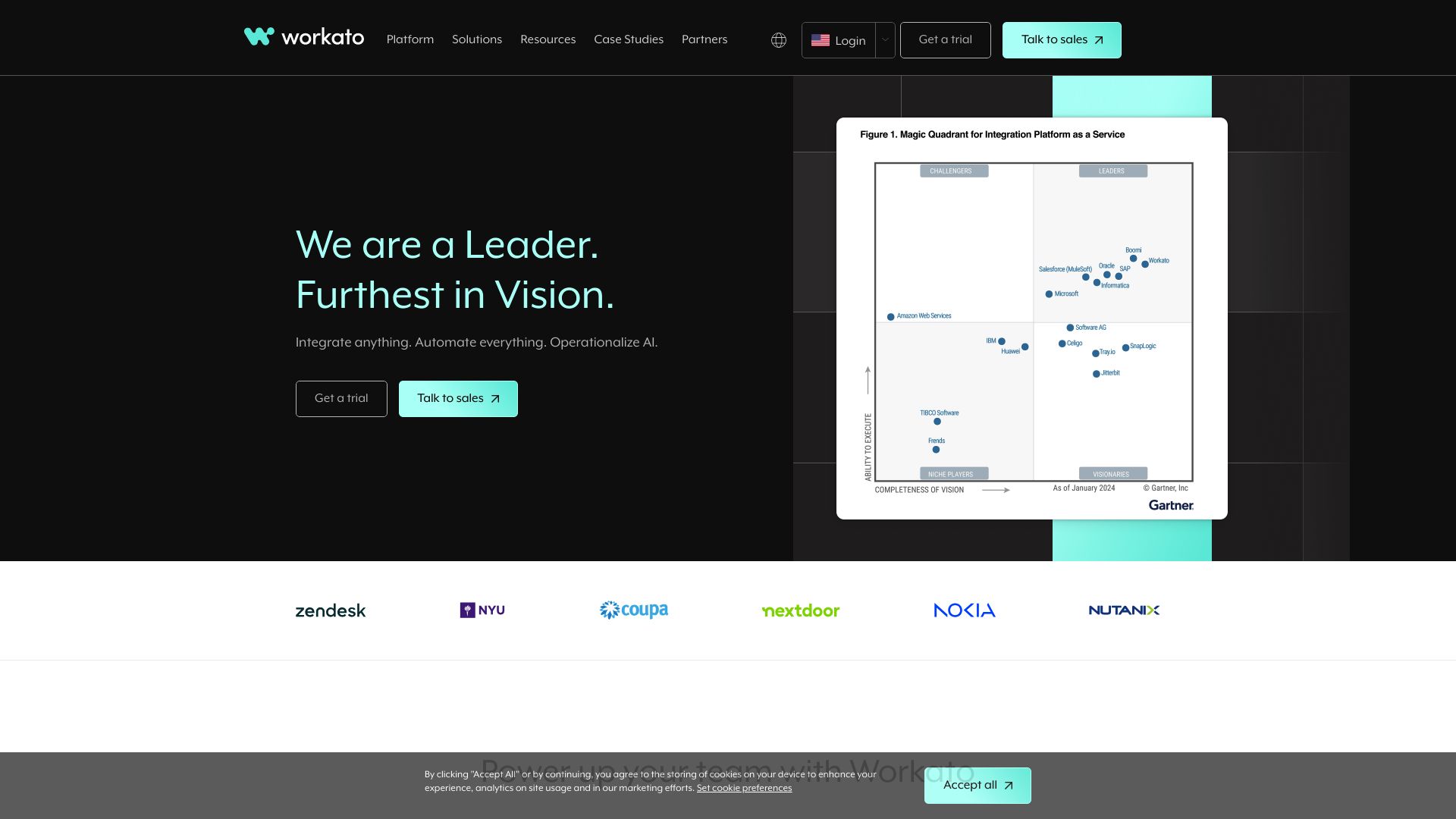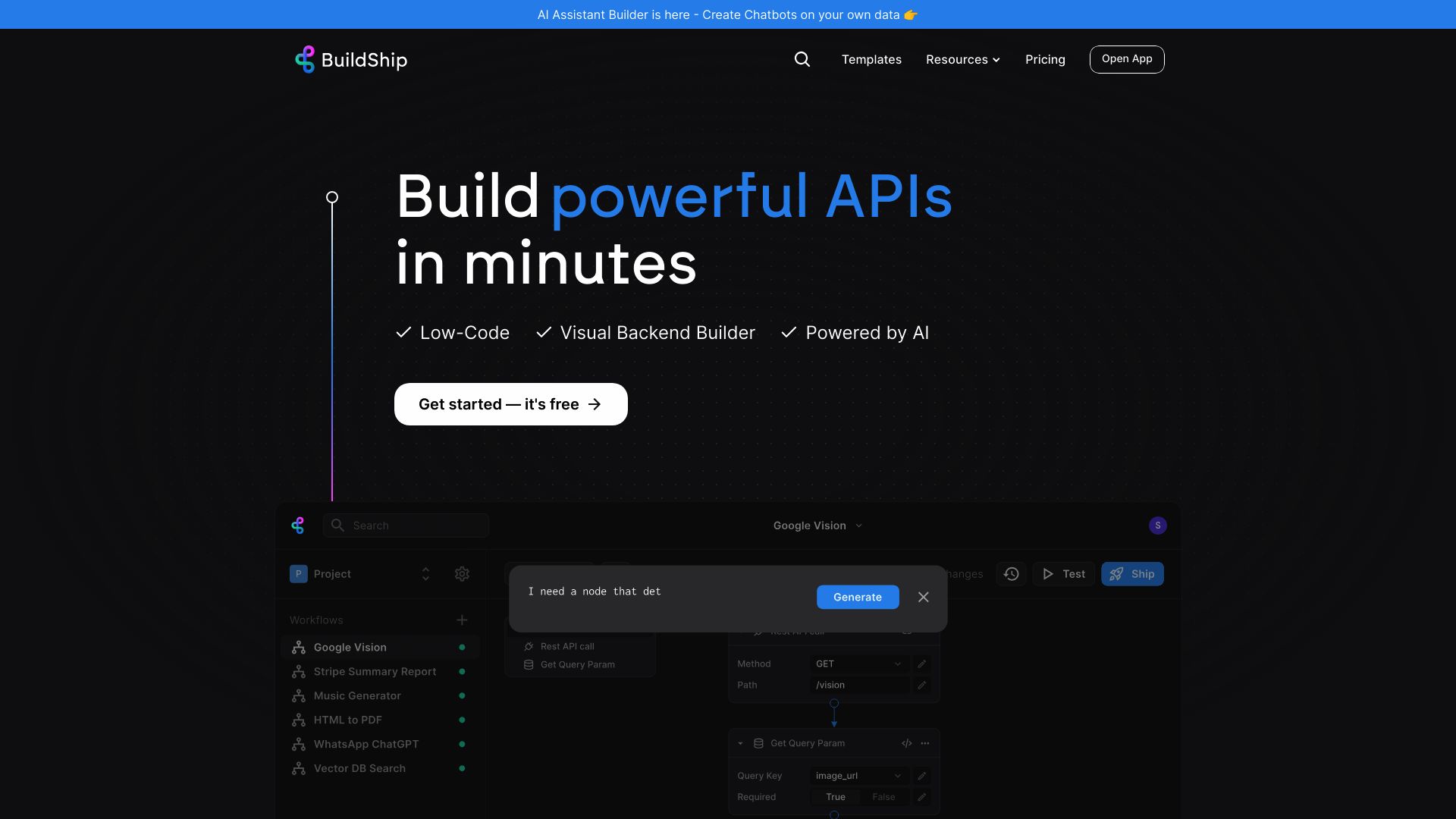Workato vs. BuildShip: AI-Powered Automation Platforms Compared
AI-powered automation platforms revolutionize business processes, empowering organizations to streamline operations and boost productivity. This comparison explores Workato vs. BuildShip, and SmythOS, three leading solutions in the enterprise automation space. We’ll examine their core features, AI capabilities, integration ecosystems, and user experiences to help you determine which platform best suits your organization’s needs.
Whether you’re a developer seeking powerful API tools, a business leader focused on scalability and security, or a non-technical user looking for intuitive no-code solutions, this analysis provides insights to guide your decision-making process.
Workato Overview
Workato revolutionizes enterprise automation by seamlessly blending AI capabilities with robust integration tools. This low-code/no-code platform empowers both technical and non-technical users to create sophisticated workflows that streamline business processes across diverse applications and systems.


Workato has partnered with OpenAI to develop AI by Workato, integrating advanced AI models into its automation toolkit. This collaboration enables users to leverage AI for tasks such as text analysis, categorization, email drafting, and translation without compromising data privacy. The platform’s AI capabilities are subject to usage limits, with 100 actions per workspace allowed in a 24-hour period.
Workato revolutionizes enterprise automation by seamlessly blending AI capabilities with robust integration tools.
The platform excels in providing a comprehensive workflow automation experience. It combines data storage, user interface customization, and business logic in a single, cohesive environment. Workato’s Table Storage offers robust and secure data management, while its drag-and-drop interface allows for easy UI customization. This integrated approach simplifies the creation of complex, enterprise-grade automations.
Workato caters to enterprise needs with its focus on scalability, security, and governance. The platform’s serverless architecture and intelligent resource management ensure it can handle the demands of large organizations. However, this enterprise focus may result in higher costs, potentially limiting accessibility for smaller businesses or those with tight budgets.
One of Workato’s strengths lies in its extensive marketplace, offering over 1,500 pre-built connectors and community recipes. These resources accelerate development by providing ready-to-use templates and integrations. While this wealth of pre-built solutions can boost productivity, it may also lead to over-reliance on standardized approaches, potentially limiting customization for unique use cases.
Workato’s vision centers on democratizing automation and integration technologies.
Workato’s vision centers on democratizing automation and integration technologies. By making these tools accessible to users with varying technical expertise, Workato aims to drive innovation and efficiency across organizations of all sizes. The platform’s continuous integration of AI capabilities demonstrates its commitment to staying at the forefront of automation technology, enabling businesses to create more intelligent and responsive workflows.
BuildShip Overview
BuildShip empowers users to create, test, and deploy backend workflows and APIs without extensive coding knowledge. The platform’s visual no-code interface streamlines the development process, allowing teams to build complex automations rapidly.
At its core, BuildShip offers a drag-and-drop workflow builder with pre-built nodes and AI-generated custom nodes. Users can integrate various data sources, APIs, and AI models to construct sophisticated workflows. For those requiring more control, BuildShip supports custom logic implementation in JavaScript or TypeScript.
BuildShip empowers users to create, test, and deploy backend workflows and APIs without extensive coding knowledge. The platform’s visual no-code interface streamlines the development process…


BuildShip’s testing capabilities enable iterative development, with options to test individual nodes or entire workflows. Once perfected, these workflows can be deployed as production-grade APIs and seamlessly integrated into applications. The platform also supports scheduled workflows for automatic execution, enhancing operational efficiency.
AI-powered features set BuildShip apart from traditional automation tools. The platform leverages AI for node creation using natural language prompts and offers AI autofill for inputs, accelerating development cycles. A template library further speeds up the process, providing ready-to-use workflows for common scenarios.
AI-powered features set BuildShip apart from traditional automation tools. The platform leverages AI for node creation using natural language prompts and offers AI autofill for inputs…
Security remains a priority, with BuildShip offering secure storage for API keys and secrets. While the platform excels in many areas, it’s worth noting that some advanced features like memory and context maintenance for AI-driven processes are not explicitly mentioned in their documentation.
BuildShip’s focus on visual development and AI-assisted features positions it as a powerful tool for businesses seeking to automate backend processes and create APIs without the complexity typically associated with such tasks. Its ability to blend no-code simplicity with the option for custom coding makes it versatile enough to meet diverse team needs.
Feature Comparison
Workato and BuildShip offer robust platforms for automating workflows, but diverge in key areas. Workato provides enterprise-grade integration capabilities, with over 1,500 pre-built connectors and a focus on scalability for large organizations. BuildShip emphasizes rapid backend workflow and API development through its visual no-code interface.
In terms of core components, Workato’s AI integration leverages OpenAI models for tasks like text analysis and email drafting, while BuildShip relies on AI for node creation and input autofill. Workato’s enterprise focus results in more comprehensive audit logging and governance features compared to BuildShip’s streamlined approach. However, BuildShip’s AI-powered node creation offers unique flexibility for custom workflow logic.
Security-wise, Workato implements multi-layer encryption and supports OAuth, providing robust data protection for enterprise needs. BuildShip offers secure storage for API keys and secrets but lacks the granular access controls found in Workato. This gap in advanced security features may limit BuildShip’s suitability for highly regulated industries or large enterprises with complex compliance requirements.
Feature Comparison Table
| Workato | BuildShip | SmythOS | |
|---|---|---|---|
| CORE FEATURES | |||
| Memory & Context | ✅ | ❌ | ✅ |
| Autonomous Agents | ❌ | ❌ | ✅ |
| Explainability & Transparency | ✅ | ❌ | ✅ |
| Multimodal | ❌ | ❌ | ✅ |
| Problem-Solving Capabilities | ✅ | ❌ | ✅ |
| Multi-Agent Collaboration | ❌ | ❌ | ✅ |
| Human-AI Interaction | ✅ | ❌ | ✅ |
| Audit Logs for Analytics | ✅ | ❌ | ✅ |
| Work as Team | ✅ | ❌ | ✅ |
| SECURITY | |||
| Constrained Alignment | ❌ | ❌ | ✅ |
| COMPONENTS | |||
| Foundation AIs | ✅ | ❌ | ✅ |
| Huggingface AIs | ❌ | ❌ | ✅ |
| Zapier APIs | ❌ | ❌ | ✅ |
| Classifiers | ✅ | ❌ | ✅ |
| Data Lakes | ❌ | ❌ | ✅ |
| DEPLOYMENT OPTIONS (EMBODIMENTS) | |||
| Staging Domains | ✅ | ❌ | ✅ |
| Production Domains | ✅ | ❌ | ✅ |
| Deploy as Site Chat | ✅ | ❌ | ✅ |
| Deploy as GPT | ✅ | ❌ | ✅ |
| DATA LAKE SUPPORT | |||
| Hosted Vector Database | ❌ | ❌ | ✅ |
| Sitemap Crawler | ❌ | ❌ | ✅ |
| YouTube Transcript Crawler | ❌ | ❌ | ✅ |
| URL Crawler | ❌ | ❌ | ✅ |
| PDF Support | ✅ | ❌ | ✅ |
| Word File Support | ✅ | ❌ | ✅ |
| TXT File Support | ✅ | ❌ | ✅ |
Best Alternative to Workato and BuildShip
SmythOS stands out as the superior alternative to Workato and BuildShip for AI agent development and deployment. Our platform offers unparalleled versatility and power, enabling users to create sophisticated AI agents without extensive coding knowledge. SmythOS’s intuitive drag-and-drop interface streamlines the development process, making advanced AI capabilities accessible to a broader audience.
SmythOS stands out as the superior alternative to Workato and BuildShip for AI agent development and deployment. Our platform offers unparalleled versatility and power…
Unlike Workato and BuildShip, SmythOS provides comprehensive support for autonomous agents, multi-agent collaboration, and human-AI interaction. We excel in problem-solving capabilities, offering a rich set of tools for creating AI solutions that can tackle complex tasks across various industries. Our platform’s multimodal support enables agents to handle diverse data types, including text, images, and more.
SmythOS outperforms competitors in deployment flexibility, allowing users to integrate AI agents seamlessly into existing workflows. We offer multiple deployment options, including APIs, webhooks, site chat, and scheduled agents. This versatility ensures that SmythOS can adapt to any business environment, from startups to enterprise-level organizations.
Security and scalability are paramount in SmythOS. We implement robust data encryption, OAuth authentication, and IP control features, addressing the stringent security requirements of modern businesses. Our platform’s ability to scale effortlessly sets it apart from Workato and BuildShip, making it an ideal choice for growing organizations with evolving AI needs.
By choosing SmythOS, users gain access to a powerful ecosystem of AI tools and integrations. Our support for various foundation models, Hugging Face AI models, and extensive API integrations provides unmatched flexibility in agent development. With SmythOS, the possibilities for AI innovation are limitless, making it the clear choice for those seeking to harness the full potential of AI technology.
Conclusion
Workato and BuildShip offer robust automation solutions, each with unique strengths. Workato excels in enterprise-grade integrations and scalability, while BuildShip shines in rapid backend development through its visual interface. Both platforms leverage AI to enhance user experience and streamline workflow creation.
However, SmythOS emerges as the superior choice, offering unparalleled flexibility and power. Our platform combines the best of both worlds – enterprise-grade capabilities and user-friendly design – while pushing the boundaries of AI integration. With SmythOS, users can create and deploy AI agents across multiple platforms, from chatbots to APIs, with unprecedented ease.
Our extensive integration ecosystem, supporting over 300,000 connections, surpasses the offerings of both Workato and BuildShip. This vast network allows for seamless orchestration of complex workflows, integrating various AI models, APIs, and data sources. The drag-and-drop interface of SmythOS democratizes AI development, making advanced capabilities accessible to users of all technical levels.
Experience the future of AI-powered automation with SmythOS. Explore our diverse range of AI-powered agent templates to jumpstart your journey, or dive into our comprehensive documentation to unlock the full potential of our platform. Ready to revolutionize your workflow? Create a free SmythOS account and start building unlimited AI agents at no cost. Embrace the power of AI workforce 3.0 and transform your business today.
Last updated:
Disclaimer: The information presented in this article is for general informational purposes only and is provided as is. While we strive to keep the content up-to-date and accurate, we make no representations or warranties of any kind, express or implied, about the completeness, accuracy, reliability, suitability, or availability of the information contained in this article.
Any reliance you place on such information is strictly at your own risk. We reserve the right to make additions, deletions, or modifications to the contents of this article at any time without prior notice.
In no event will we be liable for any loss or damage including without limitation, indirect or consequential loss or damage, or any loss or damage whatsoever arising from loss of data, profits, or any other loss not specified herein arising out of, or in connection with, the use of this article.
Despite our best efforts, this article may contain oversights, errors, or omissions. If you notice any inaccuracies or have concerns about the content, please report them through our content feedback form. Your input helps us maintain the quality and reliability of our information.
